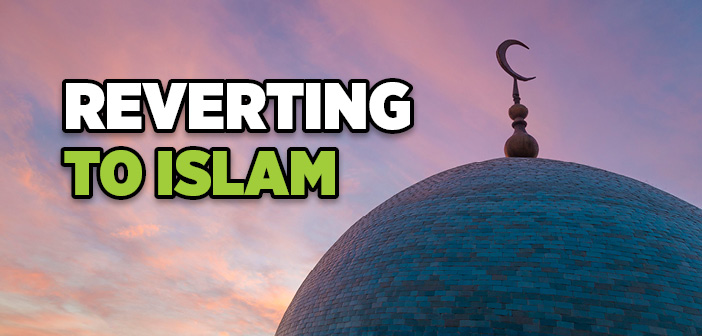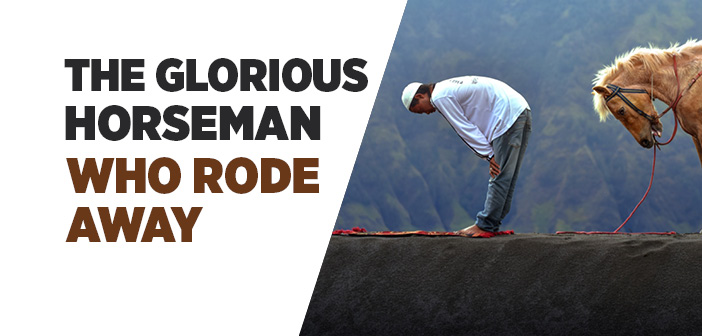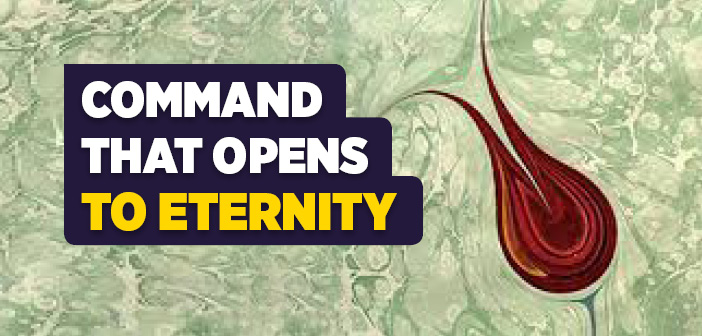What is the glorious horseman who rode away?
Necip Fazıl uses a story to explain how we have lost the treasures of our glorious past:
“During the war, a cavalry officer used to visit a village renowned for its purebred horses to buy horses for high ranking commanders on behalf of the military. It has now been a while since the war ended, and the officer, for whatever reason, has decided to revisit the village.
The armistice has taken place, the war has ended; yet, every inch of soil of the homeland is in pain, sand by sand, stone by stone.
The officer enters the village which now looks more like a ghost town. His eyes are searching for Memiş Aga.
A long silence. Memiş Aga has no intention of talking. The captain finally has enough, and asks the village’s biggest landowner and horse breeder:
‘Why are you silent, aga?’
‘What should I say, son?’
Whoever the officer asks about, he receives the answer ‘Not here’; and whichever horse he inquires, the answer is ‘Not here, gone; not here, dead!
Silence…
‘What happened to Hasan Aga of the Karabash?’
‘Not here, gone!’
Silence…
‘Then what about that famous white horse, White Cloud?’
‘Not here, dead!’
It seemed that every person he asks about is either ‘dead or gone!’, and every horse is either ‘gone or dead!’.
Why are they dead, where have they gone? Or where are the dead, why are they gone? Is it because they go that they die or is it perhaps they die that they go? Everything is dark, everything is murky…
Memiş Aga, downcast by the constant interrogation of the officer, finally opens his palm to his right; and making a gesture of departure, says:
‘Put it this way, son; all the good people have mounted the best horses and rode away!’
Today, this response echoes in our hearts every time one mentions the glorious victories and works of our ancestors and then asks ‘Where are they now?’:
“Those valiant heroes, those brave souls with hearts as vast as the seas mounted those thoroughbreds and rode away.”
With the departure of those lions, these lands have become forlorn and desolate. They have been ravaged by packs of foxes, jackals and beasts.
On the day Greek soldiers invaded Bursa and violated the graves of sultans, Mehmed Akif voiced his dismay about not being a son worthy of his ancestors:
Shame on I, the fickle and gutless son of the east,
Have let the land of the fathers trampled by the west!
As they passed through my mind, they left it in squalor
The land of Saladin and Mehmed the Conqueror
How demeaning that church bells now toll inside Osman’s head
God’s call is silenced, His remembrance in the skies is dead
How sad that a glorious past is now just a reverie
And those powers have become dust, lying in debris
A sunken dome remains from the mosque of Yildirim Khan
While shame tramples on the grand grave of Orhan
What poverty, the home of religion is torn, stone by stone
Let the millions of homeless Muslims now crawl
And the destroyed houses squirm on the ground in pain
Scattered bodies, in their hundreds, thousands carved and slain
And then let the foreigner inside the private chambers creep
Silence nightingale; it is my right, not yours, to weep
Necip Fazıl also resorts to the language of poetry to express his longing for the past:
Beat yourself in regret, River Sakarya, just as the time demands
A time when the suns of the past are in the Milky Way and beyond
Where is Yunus Emre, who once wandered on your banks?
And the army that scattered shining domes in your wake?
Where are your brothers, the valiant Nile, the Danube green?
When will the glorious horseman return home from the stream?
Does the takbir still resound in the pulse of the bullets of guns?
Does the wailing wind still catch the echo that ‘God is One’?
All the answers lie within you, for these tangled riddles to crack;
Sakarya, the nights have poured on our lamps rivers of black.
From this hapless scene, Necip Fazıl nonetheless attempts to draw an optimistic conclusion:
“As for us, we tend to imagine things in the opposite manner to Memiş Aga. That is to say, despite the many intellectual, aesthetic, social and political hopes we have, we stand on the crossroads where they all converge, lend our ear to the sound of hooves and once we see the purebreds galloping towards us, shout:
“All the good people have mounted the best horses and returned!” (Necip Fazıl, Ata Senfoni, p. 199-200)
To hold such hopes for the future, we need brave people who devote themselves and all their means to living and sustaining Islam.
To direct us towards in this path, the Almighty Allah gives us the leaders of guidance and tabligh as examples:
The Holy Qur’an mentions figures like Solomon (AS) and Dhul-Qarnayn (AS). These prophets and righteous men display a passion to use the means given by the Almighty such as kingship, to spread the truth to all corners of the world.
Solomon (AS) showed a special interest in horses as they allowed him to fight in the cause of Allah (JJ); and employed the tremendous means he was given to build a civilisation displaying the majesty of the Allah’s (JJ) religion.
Dhul-Qarnayn (AS) went to the furthermost points of the earth, where he served to guide people to the truth and protect them from all kinds of evil.
The duty of tabligh is not just about working to guide people distant from Islam. Also part of tabligh is to instruct sinning Muslims, encourage them to do good and prohibit them from committing evil. After all, both their grandfathers and ours fought side by side in Gallipoli.
Source: BEING A GUIDING LIGHT, Osman Nuri Topbas, Erkam Publications
 Source: BEING A GUIDING LIGHT, Osman Nuri Topbas, Erkam Publications
Source: BEING A GUIDING LIGHT, Osman Nuri Topbas, Erkam Publications




